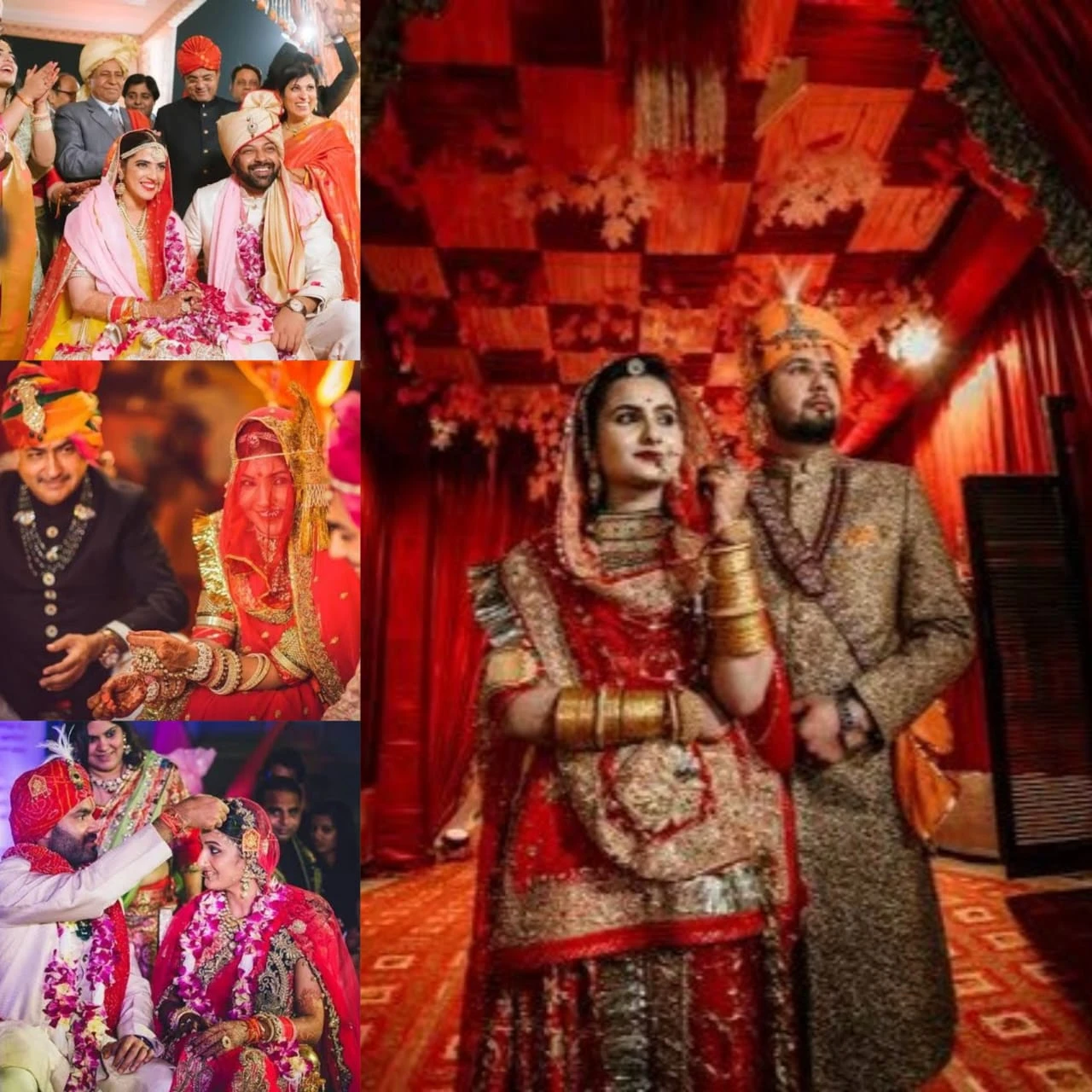
Traditions Of Rajasthani Marriage.
Rajasthan, the land of royals, forts, and vibrant colors, is renowned not only for its majestic heritage but also for its deeply rooted traditions, especially when it comes to marriage. Rajasthani weddings are a mesmerizing blend of age-old customs, elaborate rituals, and exuberant celebrations that reflect the grandeur of the region’s history and culture. Here’s a closer look at the enchanting traditions that make a Rajasthani marriage truly special.
1. Pre-Wedding Rituals
1.1. Roka and Thaka
The journey to a Rajasthani wedding begins with the Roka, a ceremony where both families officially agree to the marriage. This is followed by the Thaka, which is a formal engagement. During these rituals, families exchange gifts, and the bride and groom’s families come together to discuss the wedding arrangements and formalize their commitment.
1.2. Griha Shanti and Ganapati Puja
Before the wedding festivities commence, a series of rituals are performed to ensure the home and the marriage are blessed with prosperity and peace. The Griha Shanti puja seeks to remove any negative influences, while the Ganapati Puja is dedicated to Lord Ganesha, the remover of obstacles, to ensure a smooth wedding process.
2. Wedding Attire
2.1. The Bride’s Ensemble
The bride’s attire is a spectacle in itself. Traditionally, Rajasthani brides wear a vibrant lehenga-choli adorned with intricate mirror work, embroidery, and traditional patterns. The colors are often rich and vibrant, with shades of red, maroon, and gold being popular choices. The bride completes her look with elaborate jewelry, including necklaces, earrings, bangles, and the traditional maang tikka.
2.2. The Groom’s Ensemble
The groom typically wears a sherwani or a traditional kurta-pajama, often paired with a turban known as a pagri. The colors are generally more subdued compared to the bride's attire, with cream, beige, and gold being common. The groom’s outfit is also embellished with intricate designs and is complemented by traditional accessories such as a sehra (a decorative veil) and a sword.
3. Wedding Rituals
3.1. Ganapati Sthapana
The wedding ceremony usually begins with the Ganapati Sthapana, where a statue or image of Lord Ganesha is installed and worshipped to seek his blessings for a successful and harmonious marriage.
3.2. Baraat
The Baraat is a lively procession where the groom arrives at the bride’s place in a grand manner, often accompanied by music, dancing, and fireworks. This is a high-spirited event that highlights the joy and excitement of the wedding.
3.3. Varmala (Jaimala)
One of the most anticipated moments is the Varmala, where the bride and groom exchange floral garlands. This symbolizes their mutual acceptance and commitment to each other.
3.4. Pheras
During the Pheras, the couple circles around the sacred fire, making seven vows (saptapadi) to uphold their marital duties and responsibilities. This ritual is the cornerstone of the wedding, signifying the bond between the couple and their commitment to each other.
3.5. Kanyadaan
The Kanyadaan is a poignant ritual where the bride’s parents give her away to the groom, symbolizing their trust and blessing for the couple’s new life together. This is often a touching moment that underscores the emotional and spiritual significance of the marriage.
4. Post-Wedding Traditions
4.1. Vidaai
The Vidaai is a heartfelt farewell to the bride as she leaves her parental home to start a new life with her husband. This ritual is marked by emotional goodbyes and is a testament to the deep bonds between family members.
4.2. Griha Pravesh
Upon arrival at her new home, the bride is welcomed with the Griha Pravesh ceremony. She is often required to step into the house with her right foot first, symbolizing a positive and prosperous beginning in her new home.
4.3. Reception and Lagan
Following the wedding, a grand reception is held where the newlyweds are introduced to the extended family and friends. The Lagan, a celebration that often includes music, dance, and feasting, marks the culmination of the wedding festivities.
5. Cultural Significance
Rajasthani weddings are more than just social events; they are a celebration of culture, tradition, and community. Each ritual and custom has a deep-rooted significance that reflects the values and beliefs of the region. The vibrant attire, melodious music, and colorful ceremonies all come together to create a tapestry of traditions that are both awe-inspiring and heartwarming.
Conclusion
A Rajasthani marriage is a grand affair, steeped in tradition and rich in cultural heritage. From the intricate rituals and colorful attire to the lively celebrations and heartfelt ceremonies, each element plays a vital role in making the wedding a memorable and joyous occasion. By embracing these traditions, Rajasthani weddings not only honor their historical roots but also celebrate the timeless values of love, unity, and family.

Related Posts